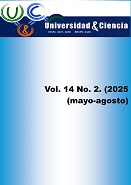Efecto del tratamiento magnético al diésel en las emisiones de gases de tractores agrícolas
DOI:
https://doi.org/10.5281/zenodo.16877993Palavras-chave:
diésel, gases de efecto invernadero, medio ambiente, tratamiento magnéticoResumo
Introducción: En esta investigación se analizaron las emisiones de gases de escape de tres tractores del parque automotor agrícola de Banes, para evaluar el impacto del tratamiento magnético al diésel con la tecnología magnética NOVAMAG®01, Objetivo: evaluar la reducción de la emisión de gases con efecto invernadero en escape de tractores, a partir del tratamiento magnético al combustible. Método: se realizaron mediciones de la composición de gases de escape de tres tractores agrícolas, utilizando un analizador de gases de combustión Testo 350; dos mediciones en 2022 y otra en 2024; antes y después de instalar la tecnología magnética. Los indicadores medidos fueron las concentraciones de gases de escape: monóxido de carbono (CO), óxidos de nitrógeno (NOx) y dióxido de carbono (CO2) provenientes de la combustión del diésel y la temperatura de salida de los gases, todo con el motor funcionando en ralenti. Una primera medición sin tratamiento al combustible y las otras luego de instalar la tecnología, donde la tercera medición se realiza al cabo de un año. Resultados: la evaluación de las mediciones evidencia una reducción significativa en la emisión de gases de escape de los tres motores. Conclusión: el tratamiento magnético al diésel en los tractores experimentales propicia una reducción de las emisiones de gases contaminantes (CO, NOx y CO2) provenientes de la combustión, lo cual sugiere una alternativa viable para potenciar el cuidado al medio ambiente agrícola.
Downloads
Referências
Ağbulut, Ü. y Sarıdemir, S. (2021). A general view to converting fossil fuels to cleaner energy source by adding nanoparticles. International Journal of Ambient Energy, 42(13), 1569-1574.
Al-Khaledy, A. A. J. (2008). High performance and low pollutant emissions from a treated diesel fuel using a magnetic field. Al-Qadisiya Journal for Engineering Sciences, 1(2), 211-224.
Arias, G. R., Berenguer, U. M., Vázquez, N. J. A., Silveira, F. Y. y Alfaro, R. C. E. (2018). Disminución de las emisiones de monóxido de carbono con el tratamiento magnético del combustible. Centro Azúcar, 45(1), 21-31.
Arias, G. R., Falcón, H. J., Campos, S. M., Silveira, F. Y. y López, G. Ó. (2018). Efecto del tratamiento magnético en el comportamiento reológico del diésel. Revista Tecnología Química, 38(2), 412-427.
Arias, G. R., Silveira, F. Y., Campos, S. M. y Falcón, H. J. (2018). Efecto de un campo magnético estático en la tensión superficial del diésel y su atomización. Revista Iberoamericana de Ingeniería Mecánica, 22(1), 9-21.
Attar, A., Arulprakasajothi, M., Vasulkar, D., Gorde, N., Kharat, S. y Kulkarni, S. (2020). Investigation of impact of the magnetic field through Halbach array on hydrocarbon fuel. International Journal of Ambient Energy, 43(1), 1-6.
Bhurat, S. S., Sharma, H., Jha, A. K., Dixit, K. K., Shukla, P. y Kunwer, R. (2018). Magnetization of diesel fuel for compression ignition engine to enhance efficiency and emissions. International Journal of Applied Engineering Research, 13(6), 341-347.
Chandrasekaran, M., Prakash, K., Prakash, S. y Ravikumar, M. (2020). Influence on performance and emission characteristics of diesel engine by introducing medium strength magnetic field in fuel and air lines. MS&E, 764(1), 12-32.
Cogollos, J. B., Vega, J. R. F., Medina, A. S. y Morales, G. B. C. (2000). Influencia del tratamiento magnetico en los parametros de salida del motor D-65. Centro Azúcar, 27(1), 19-25.
Du, E., Tang, H., Huang, K. y Tao, R. (2011). Reducing the viscosity of diesel fuel with electrorheological effect. Journal of Intelligent Material Systems and Structures, 22(15), 1713-1716.
Elamin, A. A., Ezeldin, M., Masaad, A. M. y Suleman, N. M. (2015). Effect of Magnetic Field on Some Physical Characteristics and Cetane Number of Diesel Fuel. American Journal of Applied Chemistry, 3(6), 212-216.
Faris, A. S., Al-Naseri, S. K., Jamal, N., Isse, R., Abed, M., Fouad, Z., Kazim, A., Reheem, N., Chaloob, A. y Mohammad, H. (2012). Effects of Magnetic Field on Fuel Consumption and Exhaust Emissions in Two-Stroke Engine. Energy Procedia, 18, 327-338.
Gilart, R. A., Ungaro, M., Rodríguez, C., Hernández, J., Sofia, M. y Verdecia, D. (2020). Performance and exhaust gases of a diesel engine using different magnetic treatments of the fuel. Journal of Mechanical Engineering and Sciences, 14(1), 6285-6294.
Gilart, R. A., Verdecia, D. d. l. M. D., Ortiz, C. O., García, C. E. A. y Hernández, J. F. F. (2021). Mathematical modeling of the working temperatures of a diesel engine coupled to a generator and powered by a diesel-Jatropha oil blend. Revista cubana de ingeniería, 12(2), 283-298.
Guo, H., Liu, Z., Chen, Y. y Yao, R. (1994). A study of magnetic effects on the physicochemical properties of individual hydrocarbons. Logistical Engineering College, Chongqing, 40(2), 216-220.
Jing, J., Shi, W., Wang, Q. y Zhang, B. (2019). Viscosity-reduction mechanism of waxy crude oil in low-intensity magnetic field. Energy Sources, Part A: Recovery, Utilization, and Environmental Effects, 42(3), 1-14.
Johnsson, F., Kjärstad;, J. y Rootzén, J. (2019). The threat to climate change mitigation posed by the abundance of fossil fuels. Climate Policy, 12(1), 258-274.
Kartik, Y., Raja, R. y Mithun, S. (2019). Experimental Investigation on the Effect of Fuel Magnetization for Improvement of Diesel Engine's Efficiency. SASTech-Technical Journal of RUAS, 18(1), 9-12.
Loskutova, Y. V. y Yudina, N. (2003). Effect of constant magnetic field on the rheological properties of high-paraffinicity oils. Colloid Journal, 65(4), 469-474.
Musina, N. y Maryutina, T. (2016). Application of magnetic treatment to changing the composition and physicochemical properties of crude oil and petroleum products. Journal of analytical chemistry, 71(1), 27-34.
Niaki, S. R. A., Zadeh, F. G., Niaki, S. B. A., Mouallem, J. y Mahdavi, S. (2020). Experimental investigation of effects of magnetic field on performance, combustion, and emission characteristics of a spark ignition engine. Environmental Progress & Sustainable Energy, 39(2), 13-27.
Nufus, T., Lestari, S., Ulfiana, A. y Manawan, M. (2020). Magnetization of Biodiesel (Cooking Oil Waste) to Temperature and Pressure Combustion in Diesel Engine. IOP Conference Series: Materials Science and Engineering,
Perdana, D., Yuliati, L., Hamidi, N. y Wardana, I. (2020). The Role of Magnetic Field Orientation in Vegetable Oil Premixed Combustion. Journal of Combustion, 20(3), 1-11.
Pivovarova, N. (2019). Use of wave effect in processing of the hydrocarbonic raw material. Petroleum Chemistry, 59(6), 559-569.
Pivovarova, N. A. (2004). Naturaleza de la influencia de un campo magnético constante sobre los sistemas dispersos petroliferos (en ruso). Refinación de petróleo y petroquímica. Logros científicos, tecnológicos y mejores prácticas (10), 20-26.
Taboada Zamora, A., Orlando Ernesto Rey Santos y Cardoso, O. C. G. (2021). Programa tarea vida en Cuba y su articulación con los Objetivos de Desarrollo Sostenible. Roca: Revista Científico-Educacional de la Provincia de Granma, 12(1), 1-15.
Ugare, V., Phobale, A. y Lutade, S. (2014). Performance of internal combustion (CI) engine under the influence of strong permanent magnetic field. Journal of Mechanical and Civil Engineering, 3(2), 11-17.
Verdecia, D. d. l. M. D., Gilart, R. A., Rodríguez, C. E. A., Font, Y. S., Gainza, R. O. M. y Fernández, K. d. l. C. S. (2019). Evaluation of a mixture of jatropha oil-diesel under the action of a magnetic field. Ingeniería Energética, 41(1), 1-10.
Wibowo, N., Utami, S., Riyanto, C. y Setiawan, A. (2020). Impact of Magnetic Field Strengthening on Combustion Performance of Low-Octane Fuel in Two-Stroke Engine. Jurnal Pendidikan Fisika Indonesia, 16(1), 57-62.
Downloads
Publicado
Como Citar
Edição
Seção
Licença
Copyright (c) 2025 Universidad & ciencia

Este trabalho está licenciado sob uma licença Creative Commons Attribution-NonCommercial-ShareAlike 4.0 International License.





















